Often the best way to get optimal value from airline miles both in terms of maximum luxury and absolute value against the cost of cash tickets is using them to book partner award flights. Some of the top luxury airline experiences in the world are best unlocked by using miles from another airline to book. However, this can be a confusing prospect for newcomers to the game. This guide is meant to walk you through the steps to searching for your first partner award flight.
A reader sent in the following question and this guide will walk you though the basics of searching for partner awards through the lens of this real-world example.
I live in Traverse City, MI which has a very nice but small airport (TVC). We only have American, Delta, United and Allegiant flight options. How do I utilize transfer partners? I’ve tried searching flights out of TVC on partner airlines but don’t have success. Would I need to search from a major airport like ORD or DTW and then figure out how to get from TVC to ORD or DTW separately? Any insight you have into maximizing miles when you don’t live near a major airport would be very helpful.
Thanks,
Jen

What are airline alliances?
No single airline flies everywhere and each airline has different route networks and strengths, so most major international airlines partner with other airlines to sell tickets together. This makes sense for airlines since it increases business for both sides. For instance, if you live in the United States and you’d like to travel to Dusseldorf, Germany, it would be difficult to buy a ticket without airline alliances, as there’s only one direct flight…and it’s to New York City. That’s where alliances come in. If you search for a ticket between Traverse City, Michigan and Dusseldorf, you’ll find results that combine United with Lufthansa or Austrian or that combine American with Aer Lingus, British Airways, or Iberia or Delta flights mixed with Air France as just a few examples:
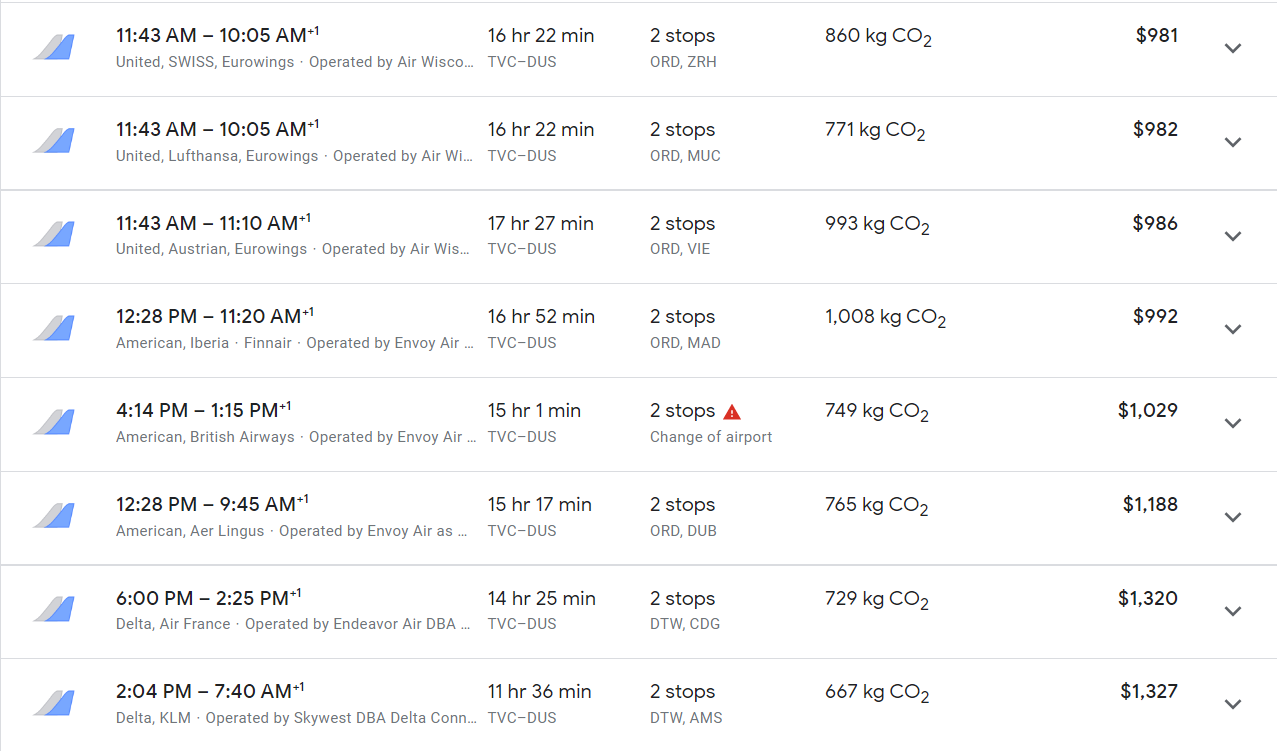
A quick glance at results like those illustrate the power of alliances: United can carry someone from Traverse City to Chicago and then either United or Lufthansa can carry them to Frankfurt and then Lufthansa can carry them on to Dusseldorf. This enables both airlines to reach those customers in Traverse City and Dusseldorf rather than being limited to carrying passengers between major cities.
For award travelers, the nice thing about alliances is that these partnerships mean that we can, for example, use our United MileagePlus miles to fly on any of United’s partner airlines. The same is true in reverse — we can use miles in a foreign partner program to book flights on United (and sometimes that can be a better deal than using United miles for their own flights!).
Thus, the first step in understanding partner award travel is being aware of alliances. There are three major world alliances with many members:
- Star Alliance: 26 member airlines (think of this as “United’s alliance”)
- oneworld: 15 member airlines (think of this as “American Airlines / Alaska’s alliance”)
- SkyTeam: 19 member airlines (think of this as “Delta’s alliance”)
Remember that you can use miles from any airline in the alliance to fly on any other airline in the alliance. In other words, as an example, you can use United Mileage Plus miles to fly on any of the 26 airlines in the alliance (so long as the airline you want to fly makes seats available to partners).
Partnerships also extend beyond alliances. Many major airlines maintain partnerships with airlines that are not members of their alliance. For instance, in addition to the 25 other Star Alliance members, United also partners with Hawaiian airlines, Aer Lingus, Azul, Air Dolomiti, and quite a few other airlines (they have 40+ airline partners in total). This is good business for the airlines because it means that United can sell you a ticket to almost any corner of the world, but it is also good news for award travelers because it means that you can use your United miles to fly on airlines that in some cases may provide a better onboard experience or more convenient itinerary.
To be clear, United and Star Alliance are not the best game in town, they just provide one example. Your American Airlines miles or to some extent Delta miles also have far broader use thanks to their alliances and that same logic is applicable even more broadly to your American Express Membership Rewards points, Bilt Rewards points, Capital One miles, Chase Ultimate Rewards points, or Citi ThankYou rewards points since those points can be transferable to various airline programs and leveraged through partner award redemptions.
For the purposes of this section, the key thing to understand is that you can use your United miles to fly on United or to fly on Lufthansa or Turkish or Austrian or any of its other partners and even on combinations of more than one partner on a single ticket. The same is true in reverse: if you have Turkish miles, you can use them to book travel on United or Lufthansa or Austrian or the many other Star Alliance airlines.
The same concept holds true for other alliances. You can use your American Airlines miles to fly on American Airlines or you can use them to fly on what are widely regarded as some of the best airlines in the world, such as Cathay Pacific, Qatar, Qantas, and Etihad thanks to partnerships.
How to save miles using partner award flights
An easily tangible example that illustrates the value of partner awards is someone looking to fly on United to Hawaii. If you want to travel to Hawaii from the mainland US, United will typically charge you 25,000 miles when there are the lowest regular-level saver awards available. Here’s an example from New York-Newark (EWR) to Honolulu, Hawaii (HNL).
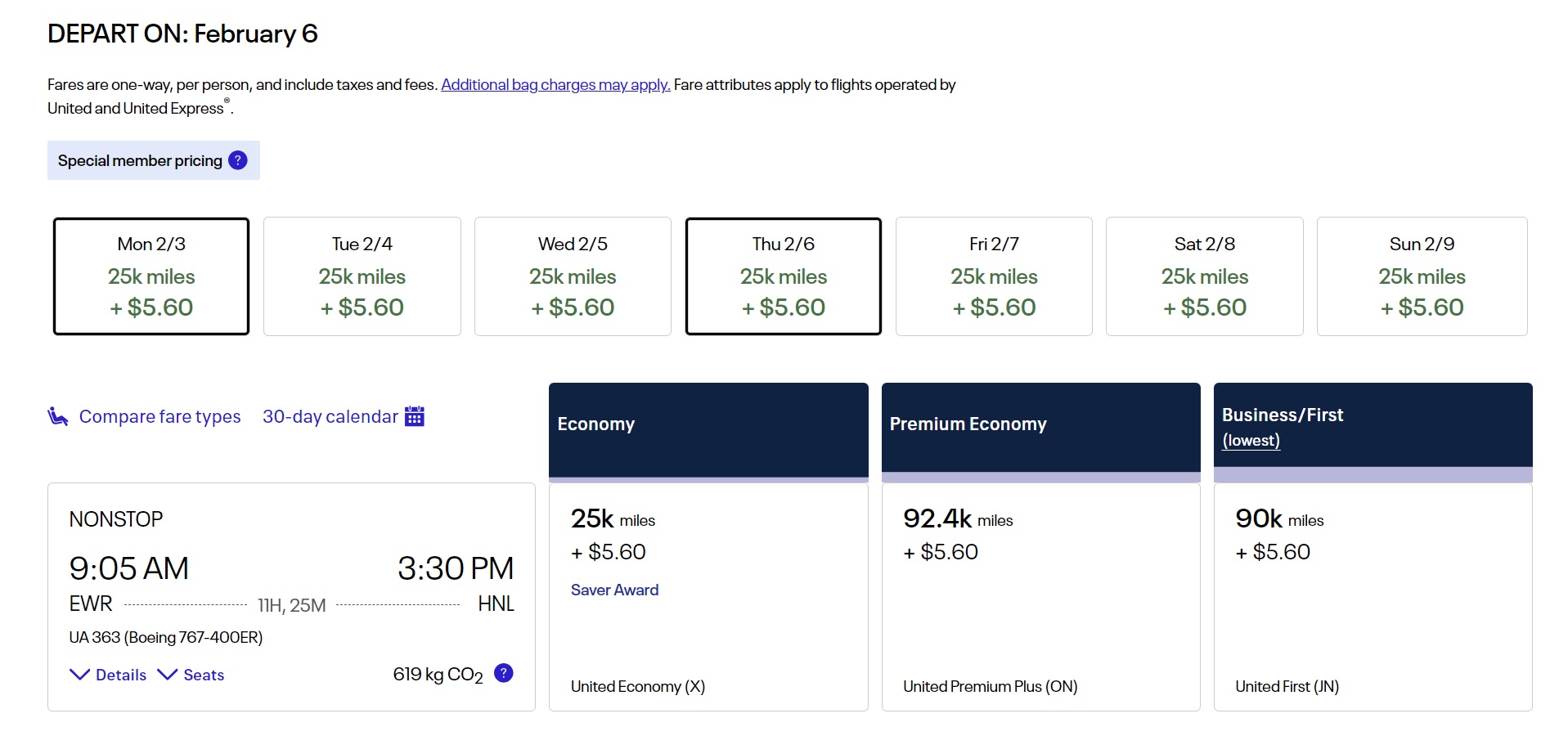
Note that United awards are dynamically-priced, so they occasionally run specials priced for fewer miles, but most of the time you’ll pay a minimum of 25,000 miles (and during periods of high demand, United offers tickets for far more miles).
However, United makes some flights available for partner redemptions. That sometimes creates an opportunity to book flights for far fewer miles through one of United’s foreign airline partners.
For instance, that same flight shown above could alternatively be booked by Air Canada Aeroplan for the same 22,500 miles one way (the departure and arrival times are different below, but this is for the same flight number — I’m not sure why Aeroplan has outdated timing listed).
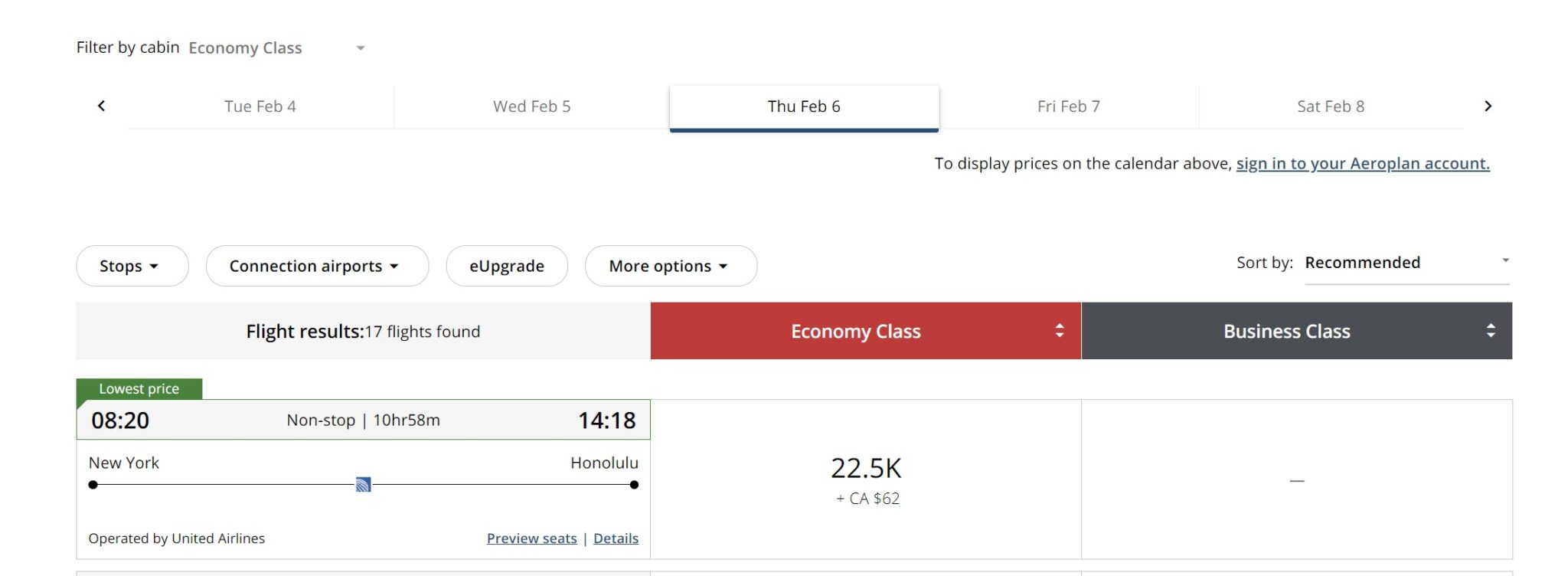
Fees would be a bit higher though Aeroplan since Aeroplan charges a $25 partner booking fee, but booking through Air Canada may be desirable if you don’t have United miles since you can transfer to Air Canada Aeroplan from American Express, Chase, Capital One, or Bilt Rewards.
However, if you have some of those transferable currencies, you can do even better. You could book that same United flight from New York to Honolulu for just 19,500 Singapore KrisFlyer miles since Singapore is also a Star Alliance airline.

You could transfer American Express Membership Rewards points, Capital One miles, Chase Ultimate Rewards, or Citi ThankYou points to Singapore and save 5,000 miles over what United would charge for the same flight.
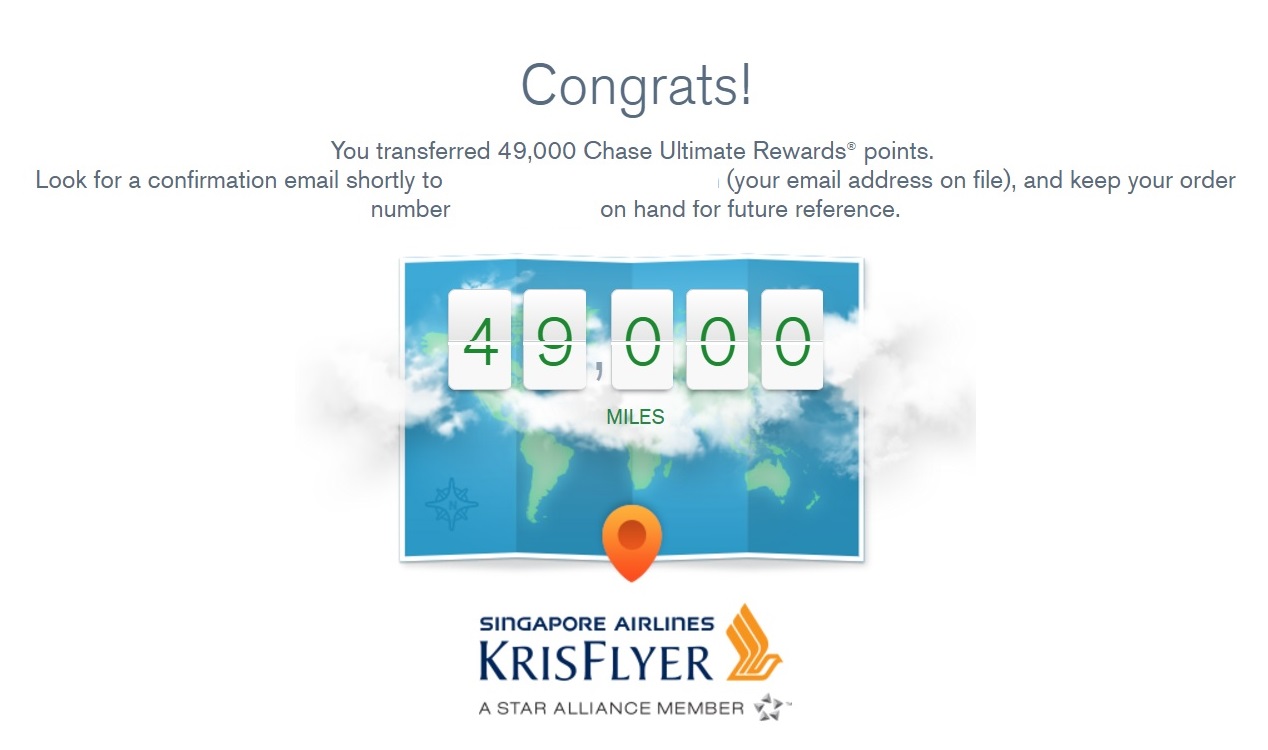
However, if you have Capital One miles, Citi ThankYou points, or Bilt Rewards points, you can do even better. The same United Airlines flight from New York to Honolulu should theoretically bookable for just 10,000 Turkish Miles & Smiles miles. In this case, Turkish even has the correct flight timing for UA363 despite the fact that Aeroplan and Singapore Airlines aren’t listing the times correctly. Taxes & fees on this award are only $5.60.
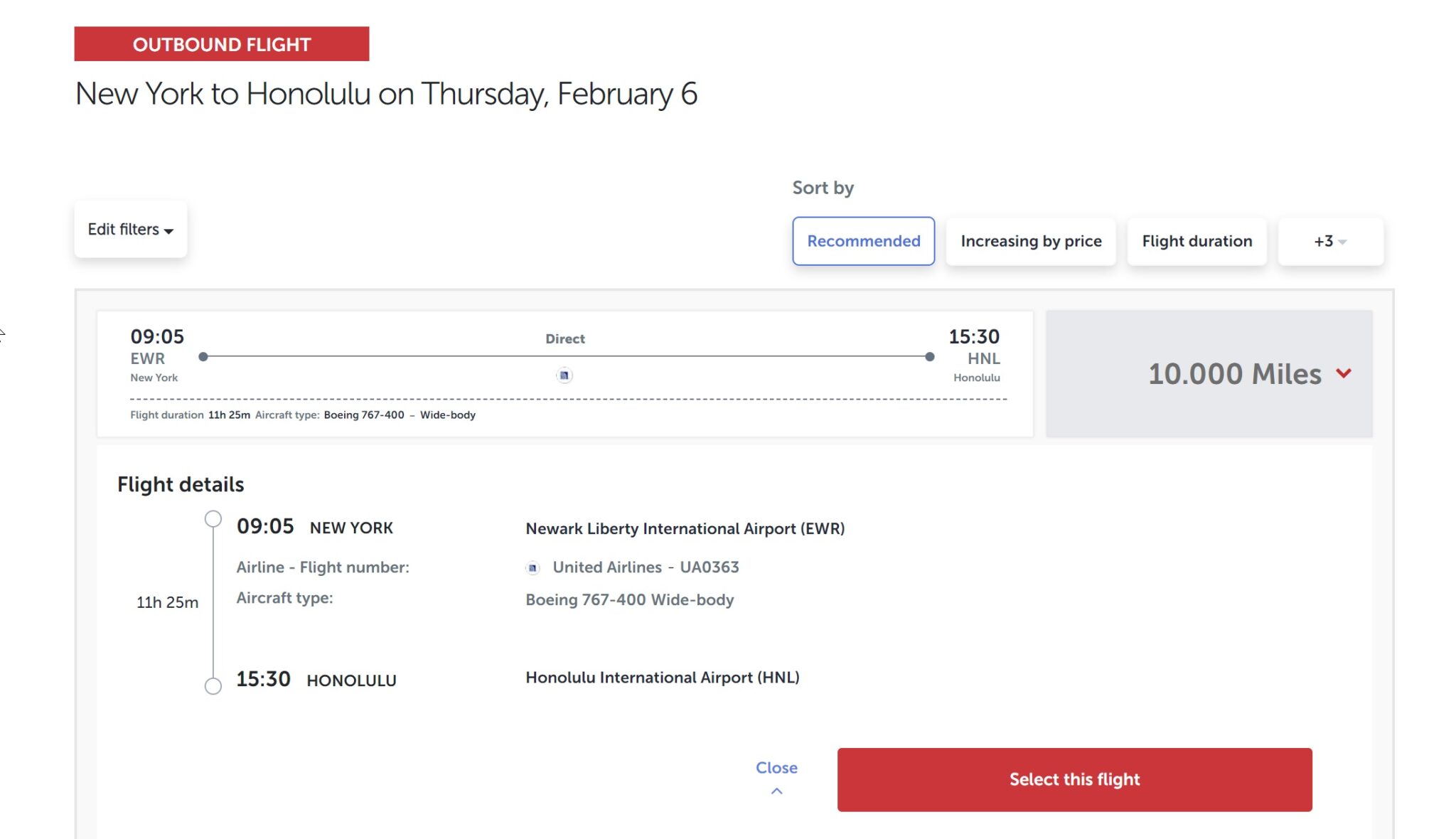
Note that the Turkish Airlines website doesn’t always work well and customer service has a subpar reputation. Still, as you can see, transferring your Capital One miles or Bilt Rewards points to Turkish Miles & Smiles to book your United flight to Hawaii could save you 15,000 miles per passenger one way over what you would need to pay United.
While Turkish can be a difficult program to work with when problems arise and as such isn’t a great fit for beginners, this example nonetheless helps to illustrate why you should care about partner awards. Using the right partner in this instance could save you 15,000 miles per passenger each way — which is enough for another one-way ticket to Hawaii in the future (or 3/4 of a future round trip!). In many other instances, booking via the right partner can save you substantially more than this example.
At the other end of the spectrum, mastering partner awards can make it possible to book some of the most luxurious experiences in the world, like Etihad apartments, Cathay Pacific or Lufthansa first class, and many more.
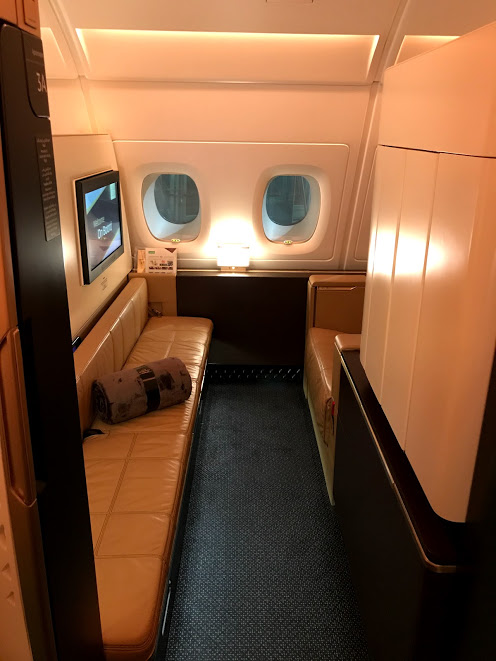
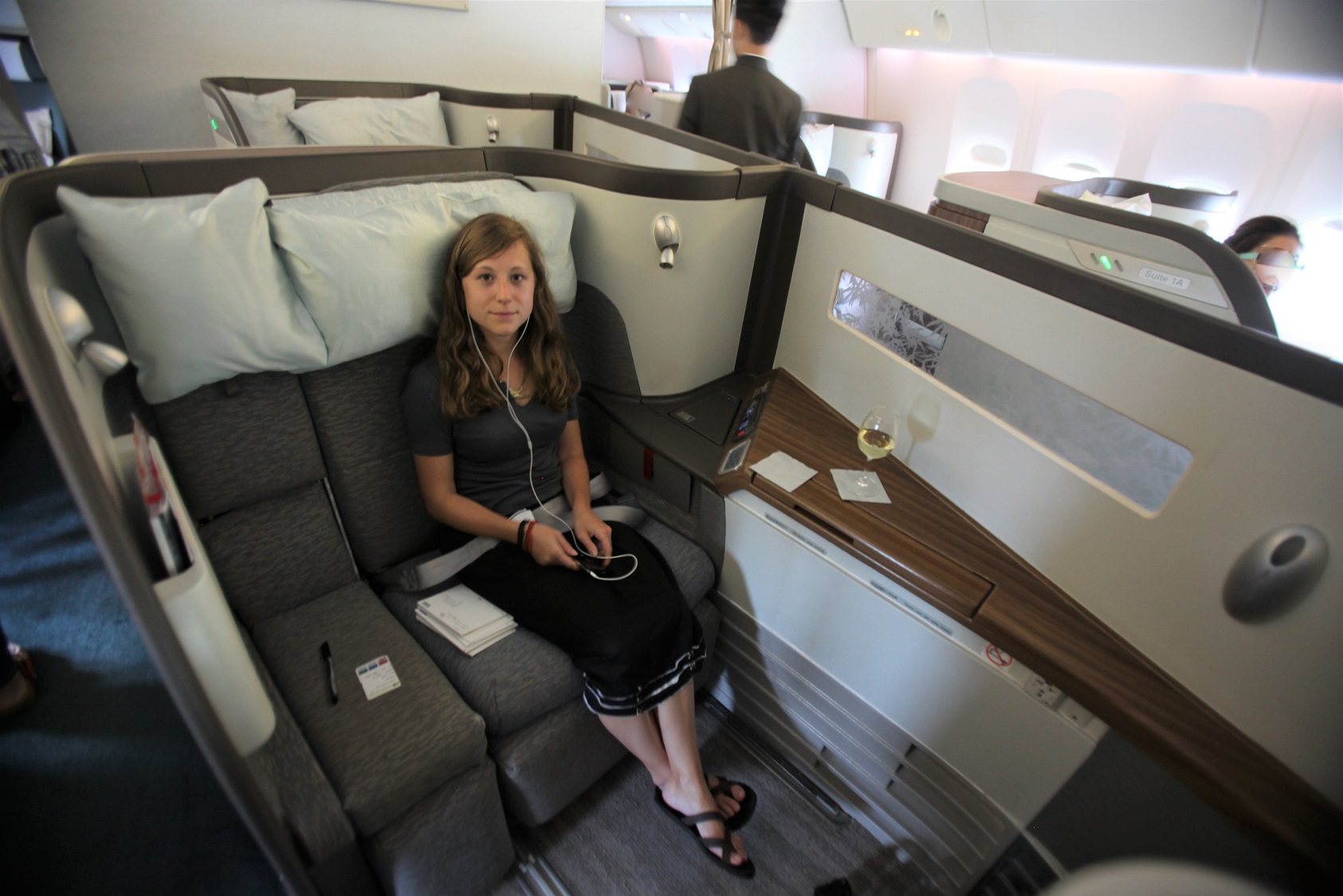
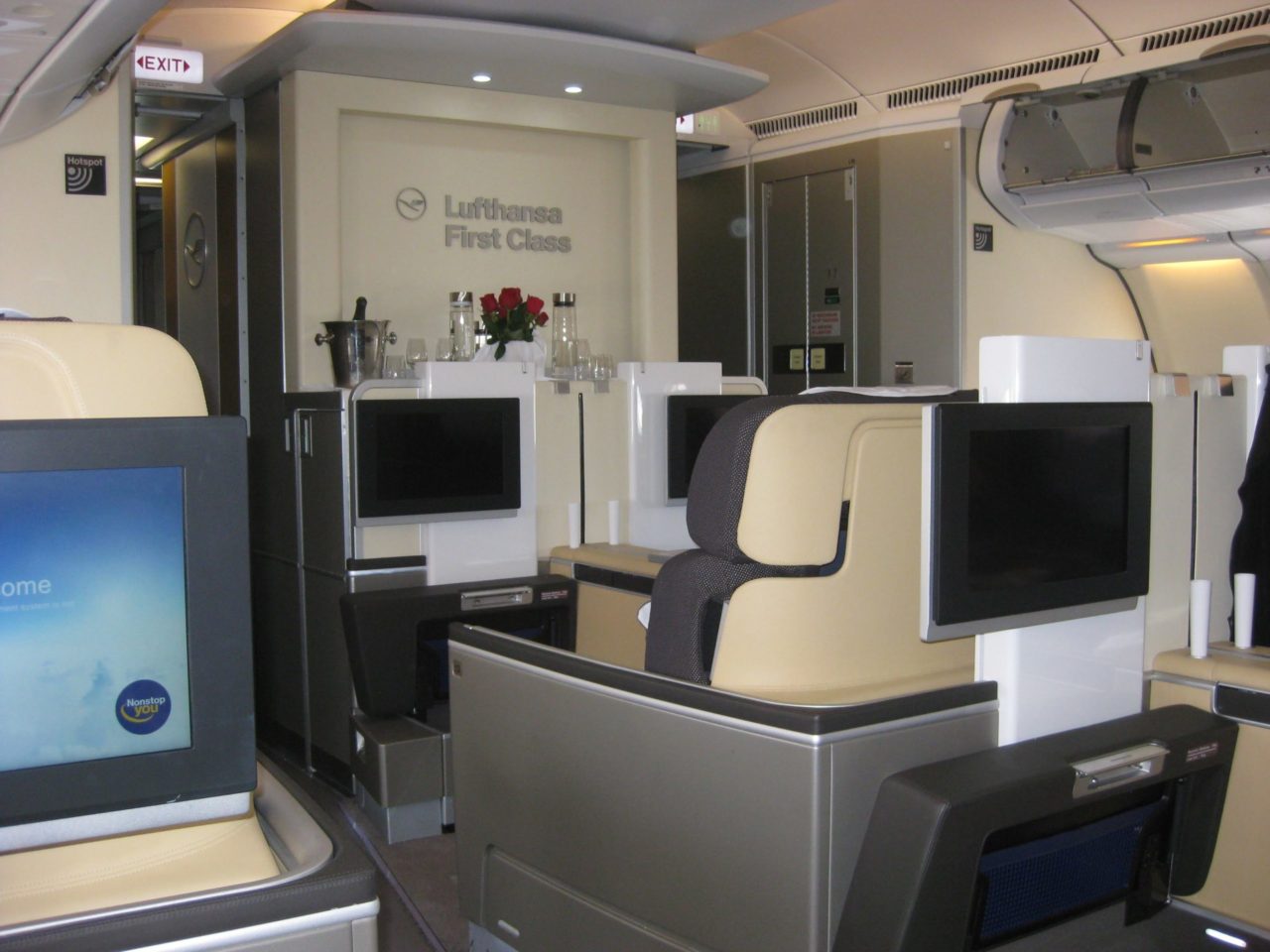
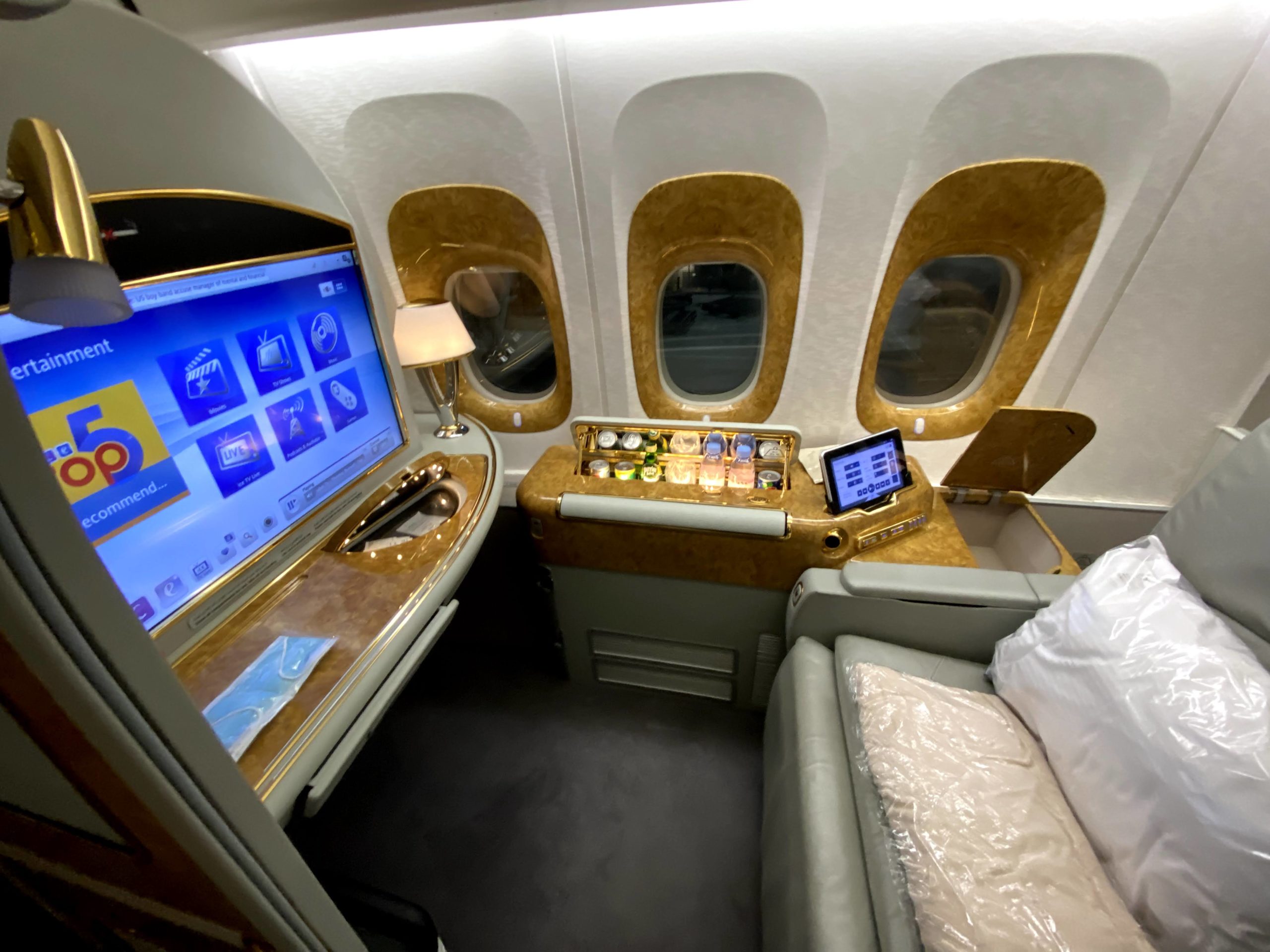
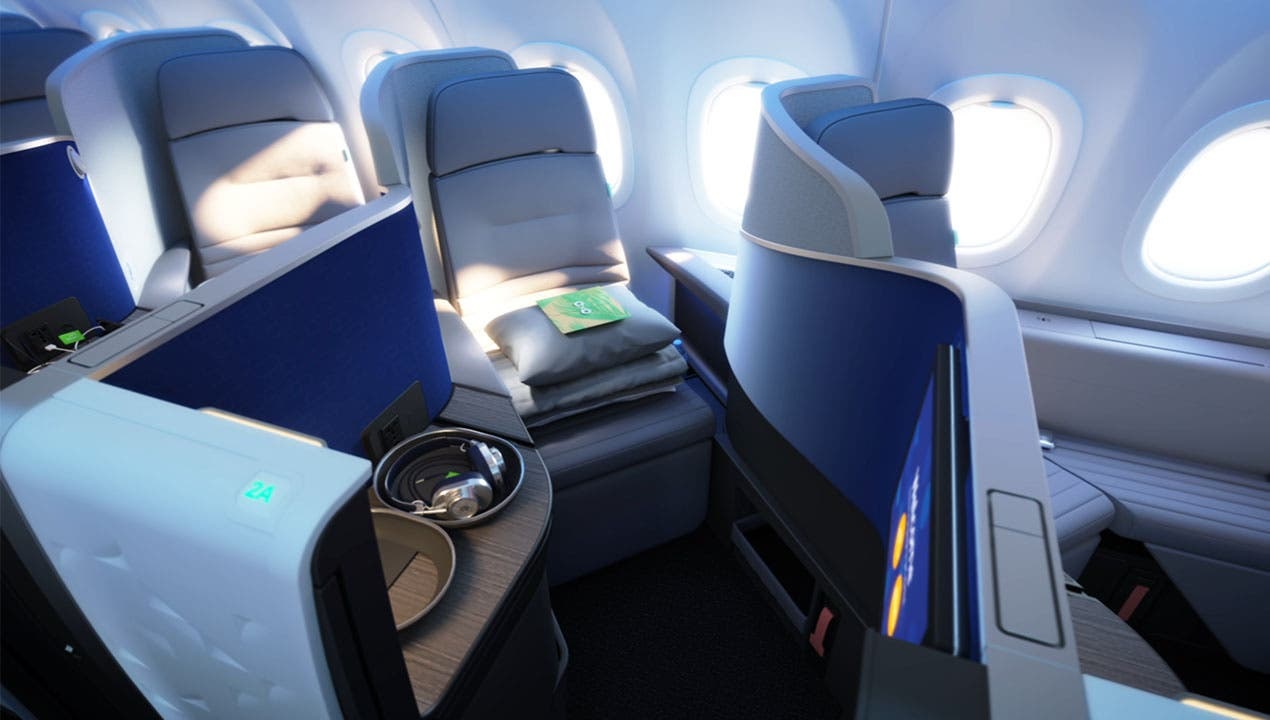
You already have miles in many airline programs
If you have a card in your wallet that earns Amex Membership Rewards points, Bilt Rewards points, Capital One Miles, Chase Ultimate Rewards points or Citi ThankYou points, you have points that can be transferred to many different airline and hotel loyalty programs. See the following resources for more information on the points you have:
- Amex transfer partners
- Bilt transfer partners
- Capital One transfer partners
- Chase transfer partners
- Citi transfer partners
Sweet spot awards
We have previously published guides to sweet spot awards using each of the major transferrable currencies. Many of these sweet spot awards involve partner award bookings. For ideas about where your miles can take you with partner awards, see these resources:
- Amex Membership Rewards sweet spots
- Bilt Rewards sweet spots
- Capital One miles sweet spots
- Chase Ultimate Rewards sweet spots
- Citi ThankYou rewards sweet spots
Keys to finding partner award flights
There are several things to know about partner awards:
- In most cases, airlines only make their lowest redemption level seats available for booking with partners. Note that this does not mean the flight must have a low cash price (quite the contrary, you can sometimes get incredible value for last-minute flights that would otherwise cost an arm and a leg). Note that there are some exceptions to this logic, particularly with airlines that have dynamic award pricing models (which is to say that sometimes a flight where Delta or American is charging a very high number of miles might still be available to partners).
- Flexibility is key. You may need to be willing to fly on a different day or during a shoulder season to find award availability (though this isn’t always true).
- Availability ebbs and flows, so what you see available (or unavailable) right now might not match what you see tomorrow.
- When booking a partner award, you pay the price charged by the carrier from whom you buy your ticket, not the airline operating your flight.
That last point is a common area of confusion. If you want to book the flight to Hawaii shown in the previous section, the price you pay depends on which airline miles you have. If you have United miles, there is no way to “transfer” those miles to Turkish to take advantage of lower pricing — if you use United miles, you pay the United price.
If you want to pay the (cheaper) Turkish price, you’ll need to have Turkish miles, which you can get by transferring from your Capital One, Citi or Bilt Rewards account to your Turkish Miles & Smiles account when you are ready to buy your ticket. Again, you’ll be buying a ticket to fly on United Airlines, but you’re buying the ticket from Turkish Miles & Smiles. I should note that this is just one example used to illustrate — in reality, there are sometimes challenges in booking awards via Turkish Miles & Smiles.
The best analogy I can give here is that you might want to buy a 32oz Coca Cola. You can buy it from any place that sells Coca Cola, but the price you pay depends on where you buy it. If you want to buy it at a gas station, it might cost you a buck or two. If you want to buy it at a sports stadium, it might cost you five or ten bucks. You’re ultimately getting the same product (a 32oz Coca-Cola), but the point of purchase matters. The worker at the sports stadium isn’t going to care that you can buy it at 7-11 down the block for $0.99 — you can’t get the 7-11 price if you’re buying from the stadium concession stand — you’ve got to go to 7-11 and accept whatever hassles are involved with that if you want to pay the 7-11 price.
Understanding carrier-imposed surcharges vs taxes
All airline tickets incur taxes. Even when traveling on an award ticket you will need to pay mandatory taxes. Taxes vary wildly by country of departure. For instance, when departing the United States, you’ll typically pay only $5.60 in taxes. However, many countries around the world levy a departure tax of somewhere around $100 (some less, some more). Everyone pays that tax whether it is rolled into the price of your cash ticket or charged in addition to the miles on your award ticket.
Some airlines levy additional charges on award tickets. These additional fees were once referred to as “fuel surcharges” because the airlines that impose them began collecting them “because of rising fuel prices”. However, when fuel prices decreased, those surcharges weren’t eliminated, proving that they weren’t really about the cost of fuel. Therefore, it is more accurate to refer to these surcharges as “carrier-imposed surcharges”.
Some airlines never charge surcharges on their own flights (for example, American, Delta, and United never impose these surcharges). Some airline award programs never add surcharges on award tickets (for example, United and Avianca are two programs that never collect fuel surcharges even on partner awards). Other airlines impose surcharges that are passed on by most of their partners (British Airways is a good example as most programs pass along most of their surcharges).
Of airlines that impose surcharges, the most exorbitant tend to be British Airways and the Lufthansa Group, though Lufthansa surcharges can be totally avoided by booking through Star Alliance programs that do not pass on surcharges like United, Avianca, and Aeroplan. If you are new to award booking, it is worth being aware that there will be some cost beyond the miles and that the associated cost (taxes & fees) can vary quite dramatically between airlines.
By the same token, be aware that you’ll be bound by change and cancellation policies of the program from which you buy your ticket. For instance, United Airlines allows free changes or cancellation of award tickets right up until departure when booking through United Mileage Plus. However, if you book your United Airlines ticket through Turkish Miles & Smiles, you’ll pay a $70 fee to change or cancel.
Start with the long-haul flights and then widen the net
The first step to finding partner awards is usually finding the long-haul flights. That is to say that you need to find the dates where the long flights across oceans are available since those are the flights carrying you most of the way. This is especially true for those of us who are primarily focused on booking premium cabin seats since you want those long-haul flights in comfortable / flat-bed seats. There are situations where this methodology may not work best, but more on that later. Checking the long-haul routes is generally a good starting point.
It’s worth mentioning here that many who use miles and points primarily focus on flying business and first class because the difference in price between economy class and business or first class award tickets (using airline miles) is often far less than the difference in cash price if you were to buy a ticket. As an example, a one-way economy class ticket to Europe might cost you $500, whereas a one-way business class ticket would likely cost north of $2,000. Economy class award tickets can commonly be found for 25,000 or 30,000 miles. Business class award tickets to Europe from the United States can be had as cheaply as 34,000 miles one-way (or more commonly for 45K-70K miles one way).
For argument’s sake, let’s say that Jen, our reader from Michigan, wants to get from Traverse City to Dusseldorf, Germany. I would start by figuring out which airlines serve Dusseldorf so that I know which partnerships to search. The website FlightConnections.com will show you all of the nonstop flight options from any given airport. Using that site, we can see that Dusseldorf is served by almost all of the major European airlines.
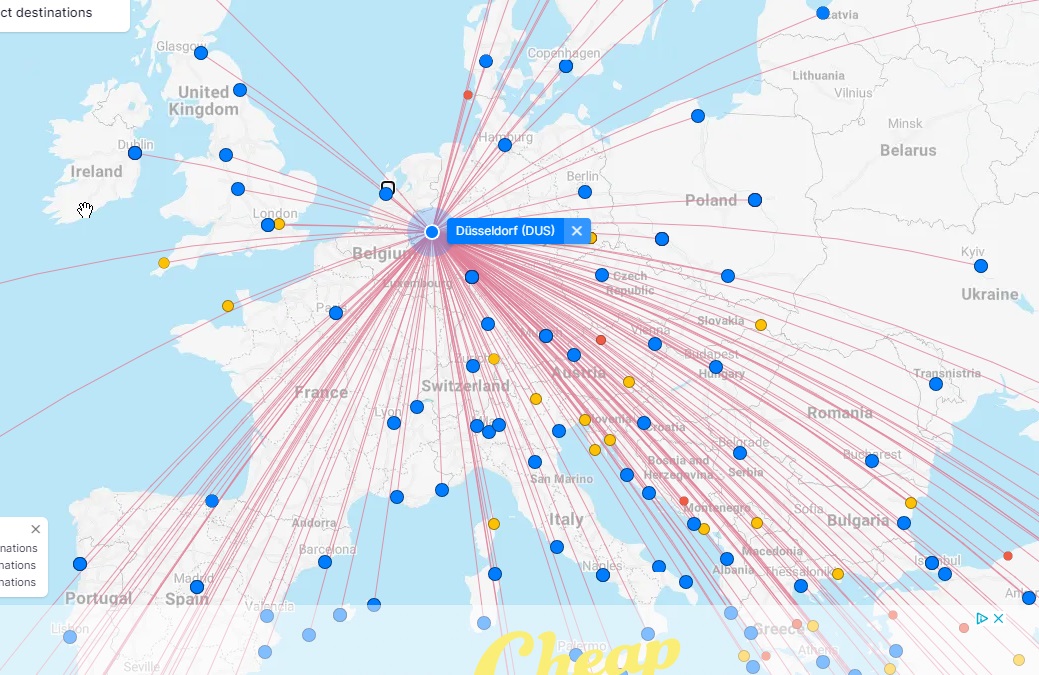
The good news is that this means that we can search all of the major alliances knowing that we could connect on British Airways, Aer Lingus, Finnair, or Iberia if booking via oneworld or on Lufthansa, Austrian, SAS, or LOT Polish if booking via Star Alliance or Air France / KLM if booking via SkyTeam, etc.
My next step is going to be to find which US gateways will be the easiest to reach for someone originating in Traverse City. Good news for Jen: Traverse City is served by all of the major US carriers, so she could easily fly from Traverse City to cities like Chicago, Detroit, or Boston to position for an international flight.
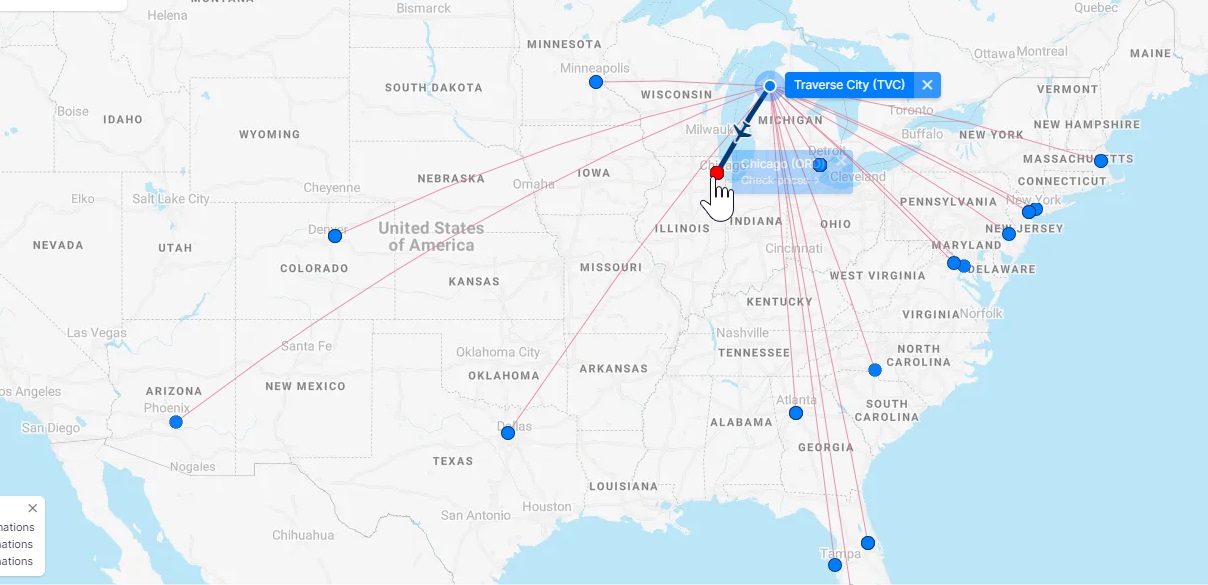
Jen really has easy access to multiple US gateways.
My next step would be to look for awards from those US gateways to Europe. Those who live in smaller cities sometimes need to book a separate positioning flight to get to the international gateway (like Chicago, Detroit, New York, etc) and other times it will be possible for that leg to be part of the larger award ticket. Since the most important flight is the transatlantic one, I would search from the US gateways with a focus on finding the long-haul availability to start.
To save myself a little time, I will sometimes start by searching from those major US gateways to the final destination (for instance, from Chicago to Dusseldorf or from Boston to Dusseldorf). If I can’t find any availability, I might narrow the search to just long-haul flights like Chicago to Frankfurt or Boston to Amsterdam to see if I can find the longest sections of the award I want.
Award search tools will save you a lot of time
This post will go on to explain the nuts and bolts of searching for airline awards manually using airline websites. While I think it can be useful to learn how to do that for yourself, the truth is that the process of searching manually through multiple airline websites to cover various alliances/partnerships is cumbersome. A far easier (and far less time-consuming) way to find award options is by using an award search tool. I really think that any beginner will find awards more quickly and be more likely to get a good award deal by employing one or more (free) award search tools. As you become more advanced, you may find that you want some of the features of the paid versions, but there are great free tools available to start.
Over time, multiple different award search tools have popped up. At a high level, each tool is designed to search awards across multiple sites and/or dates at once. If you’re new to the game, I’d probably recommend signing up for a free account at either AwardTool.com or PointsYeah.com (or both!). Both tools allow you to search across multiple dates through multiple programs and even to customize which programs to search based on which airline miles or transferable points you have.
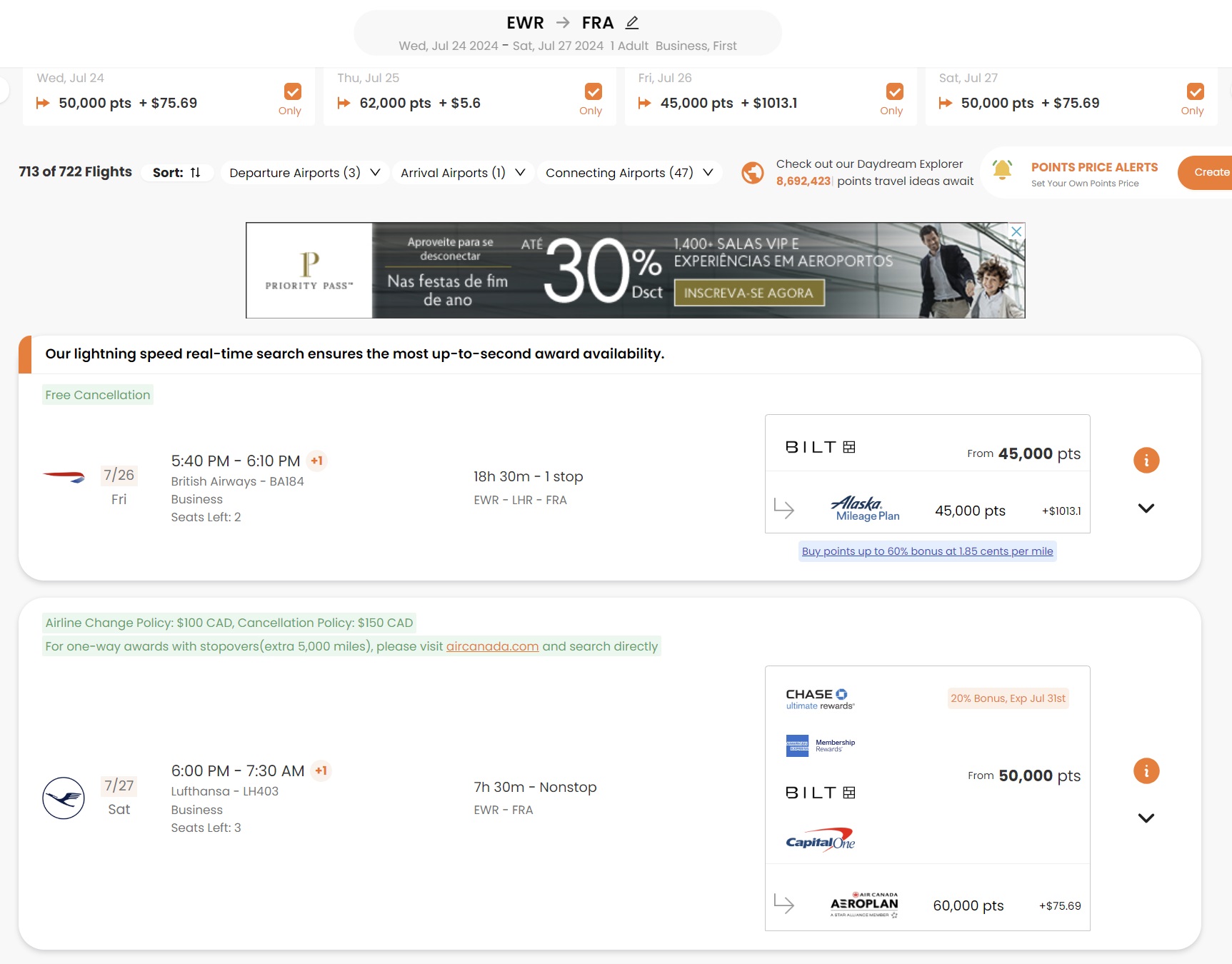
I think a beginner should also strongly consider installing the Points Path Chrome extension. Once you’ve installed the extension, you’ll see award pricing alongside your Google Search results when there is availability through the programs that Points Path supports. That can be incredibly valuable for comparing the value of at least some of the available awards.
We have an excellent comparison post that digs into each of those tools and their relative strengths and weaknesses as well as those of numerous other award search tools that may be of interest. See: Which award search tool is best? for a comparison.
You may also find it helpful to check out a couple of the following deep dives into award search tools:
- Pointsyeah: Free flight award searches and alerts
- Award Tool: A powerful new award search tool
- Points Path: An easy “set and forget” award search tool
Note that we do have an affiliate relationship with Pointsyeah and Award Tool. If you sign up for the paid versions of Pointsyeah or Award Tool through our affiliate links, Frequent Miler will earn a commission. That said, I think that most beginners will find the free versions to be a great starting point that will make it possible to compare award availability across multiple programs much more quickly and easily than by searching multiple airline websites.
That said, if you’d like some exercise in using separate airline websites for searches, the next several sections delve into how to go about doing that.
The best sites for finding partner award flight availability in each alliance
Finding partner availability can be tricky. Some airlines make partner availability easy to see online, others require a phone call to search and book partner awards. Thankfully, even in cases where you will ultimately need to call to book over the phone, you can get a good idea as to what is available by using the right site for each alliance.
oneworld partner award flights: BritishAirways.com and/or Qantas.com
When it comes to searching for oneworld partner awards, the American Airlines website is actually pretty good. You can search and book partner awards with quite of few of AA’s partners on AA.com.
However, the American Airlines website doesn’t show all oneworld partners and it is known to sometimes show phantom availability (seats that show up in an award search but aren’t actually bookable).
More reliable options for searching for oneworld award availability are BritishAirways.com and Qantas.com. You will need to create a British Airways Executive Club account to log in and search for awards at the British Airways website and the same is true for the Qantas site (that is to say that you’ll need to create a Qantas Frequent Flyer account to search at Qantas.com).
As an example, head to Qantas.com and select flexible dates in the search tool on the home page and make sure that the “Use Points” option is toggled on like this:

Then you’ll catch an easy look at award availability at a glance for a month at a time with an easy key to see which dates have seats in economy, premium economy, business class, or first class.
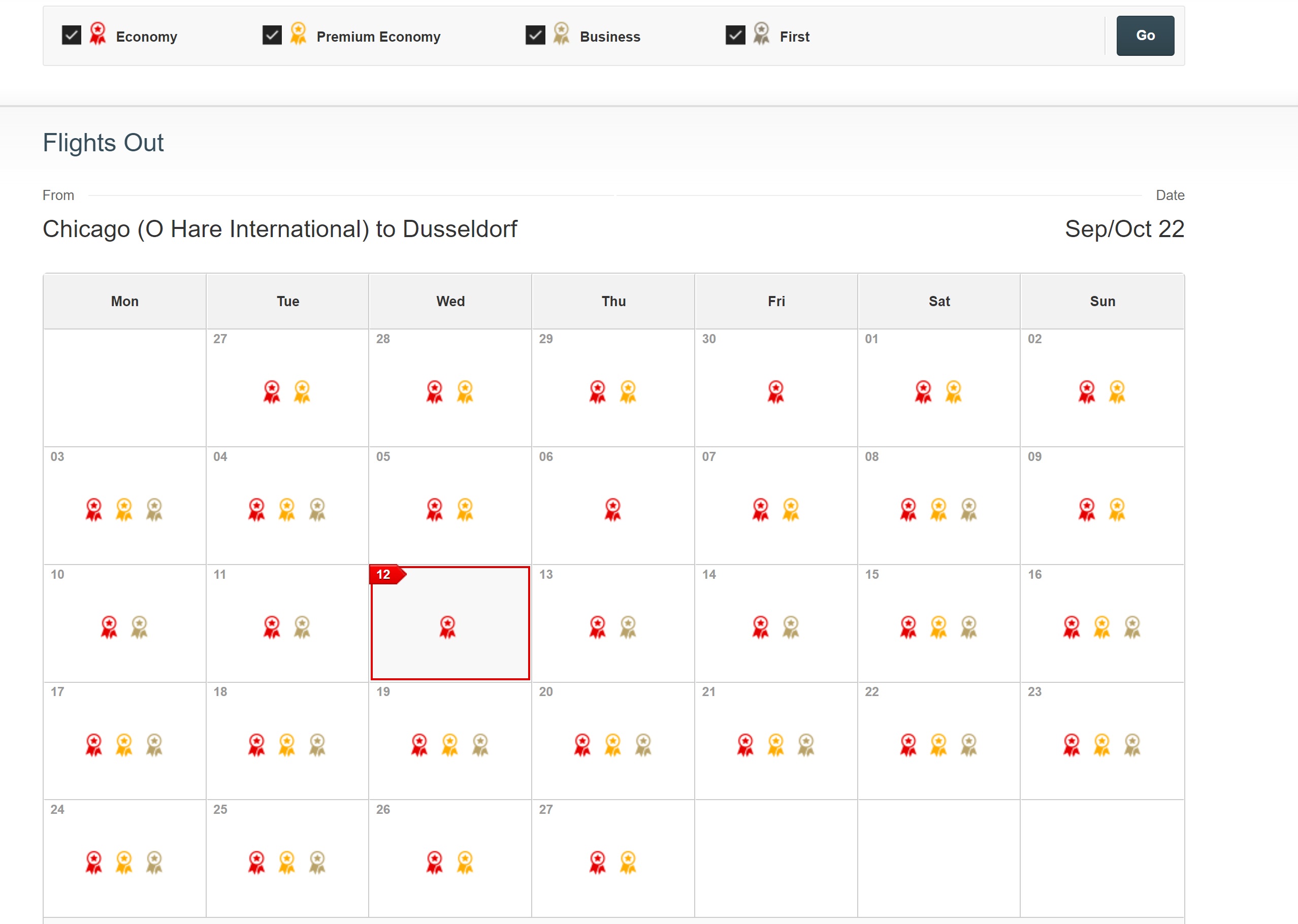
Unfortunately, you’ll sometimes find that the business class availability is actually mixed-cabin, like this award where the long-haul flight from Chicago to London would be in economy class (followed by “business class” on the leg from London to Dusseldorf; whereas business class on intercontinental flights means flat bed seats, on flights within Europe, “business class” just means an economy class seat with the middle seat blocked).
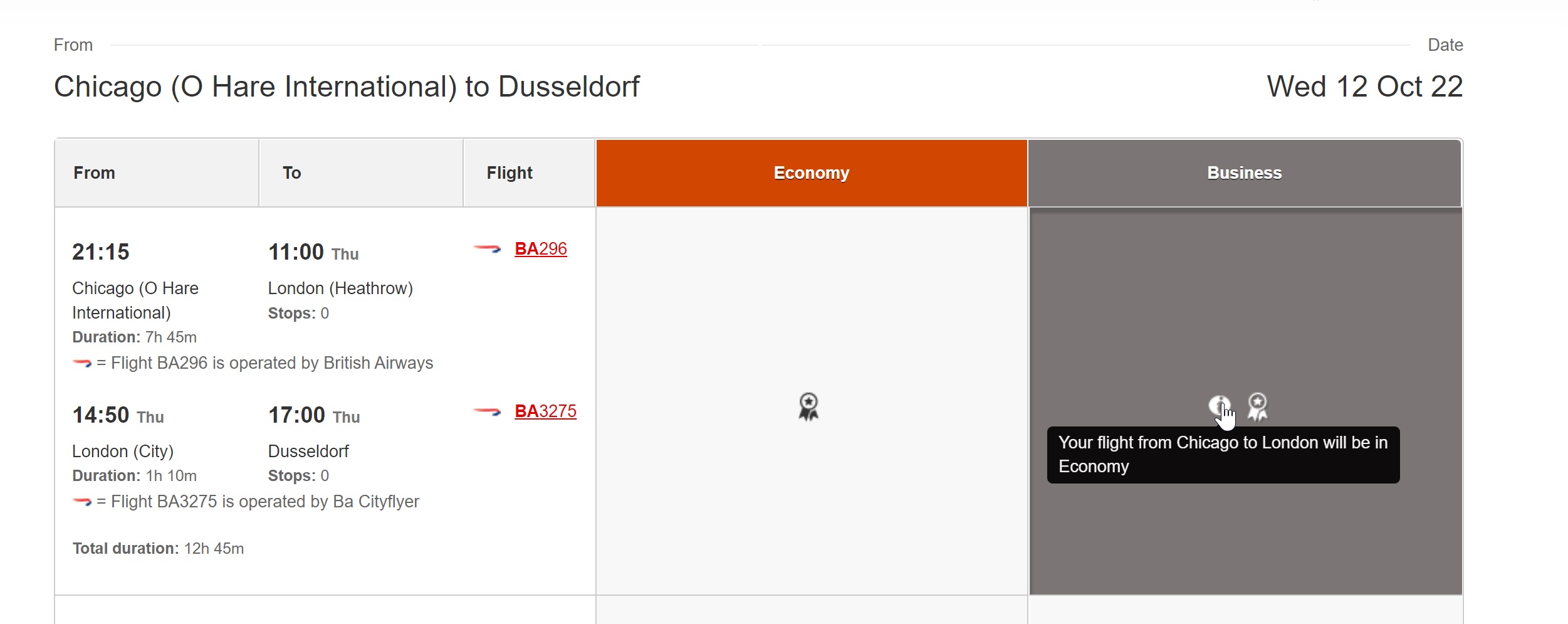
However, searching from New York on the same date shows business class availability on both legs for this itinerary (business class is the column on the far right here).

Shown above is a search for two passengers in business class from New York (JFK) to Dusseldorf (DUS). Again, I searched that at oneworld partner Qantas.com. Since those seats are available to oneworld airline Qantas, they should be available when booking via any oneworld program. The price you pay will depend on the program with which you book.
Qantas will charge 75,000 miles per passenger one way.

American Airlines charges 57,500 miles per passenger (ignore the high taxes & fees for now — British Airways is notorious for its high surcharges. British Airways isn’t a great award booking option in this case, it’s just an example to illustrate the way things work).

The same exercise could be repeated with any oneworld airline.
The next step for Jen would be figuring out how to get to New York. Unfortunately, award options are slim and there are no nonstop flights between Traverse City and New York. Jen might be best off booking a paid flight to New York if she wanted to travel on that specific day.
However, she might rather consider looking for something that departs the United States from Chicago since Chicago is a short nonstop flight away that can often be booked for a very reasonable number of miles as a separate positioning flight.
Star Alliance partner award flights: United.com* or AirCanada.com
United.com has long been the go-to site for seeking out Star Alliance award space. That’s still true, albeit with a couple of caveats.
First, note the asterisk above. United elite status and credit card holders get access to expanded availability on United flights that isn’t accessible to partners. That’s no problem if you’re looking to use your United Mileage Plus miles to book your flight. If you ultimately want to use partner miles, then you don’t want to be looking at expanded award availability. The solution to this problem is that you do not log in to your United account during the search process (despite being prompted to do so, you can hit an “x” in the top right corner of the login prompt to dismiss it).
The second reason for the asterisk is the United tool isn’t as intuitive as it once was. You can sort results by price in business class, but it isn’t plainly obvious how to do so.
Still, it can be a great starter tool for finding award space.
I would typically use the same method shown in the oneworld section above. That is to say that to start, I would look for award availability on long-haul Star Alliance flights from Chicago, Boston, etc. For example, knowing that Lufthansa flies to Dusseldorf from Frankfurt, I may search Chicago to Frankfurt, Boston to Frankfurt, etc.
However, I could try searching Traverse City all the way to Dusseldorf on United.com.
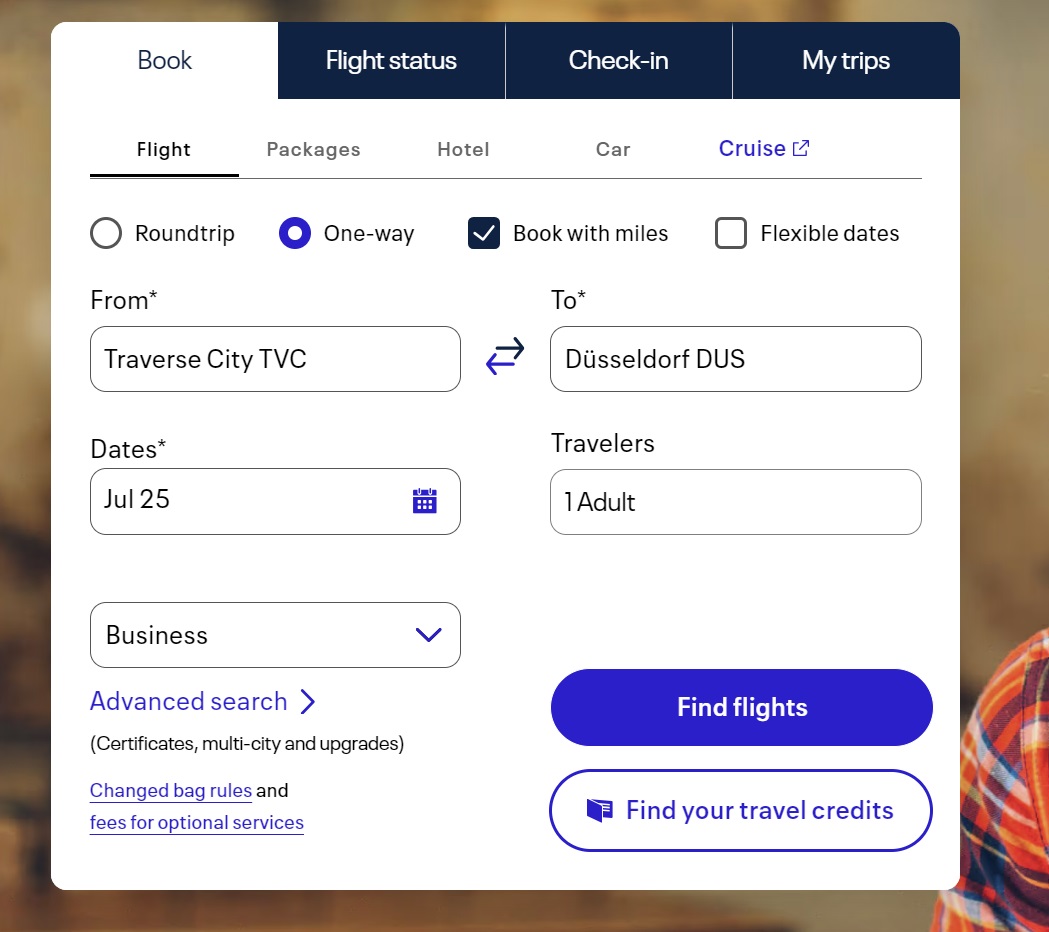
Sure enough, United.com came up with several itineraries in economy class for 44K miles or business class for 88K miles.
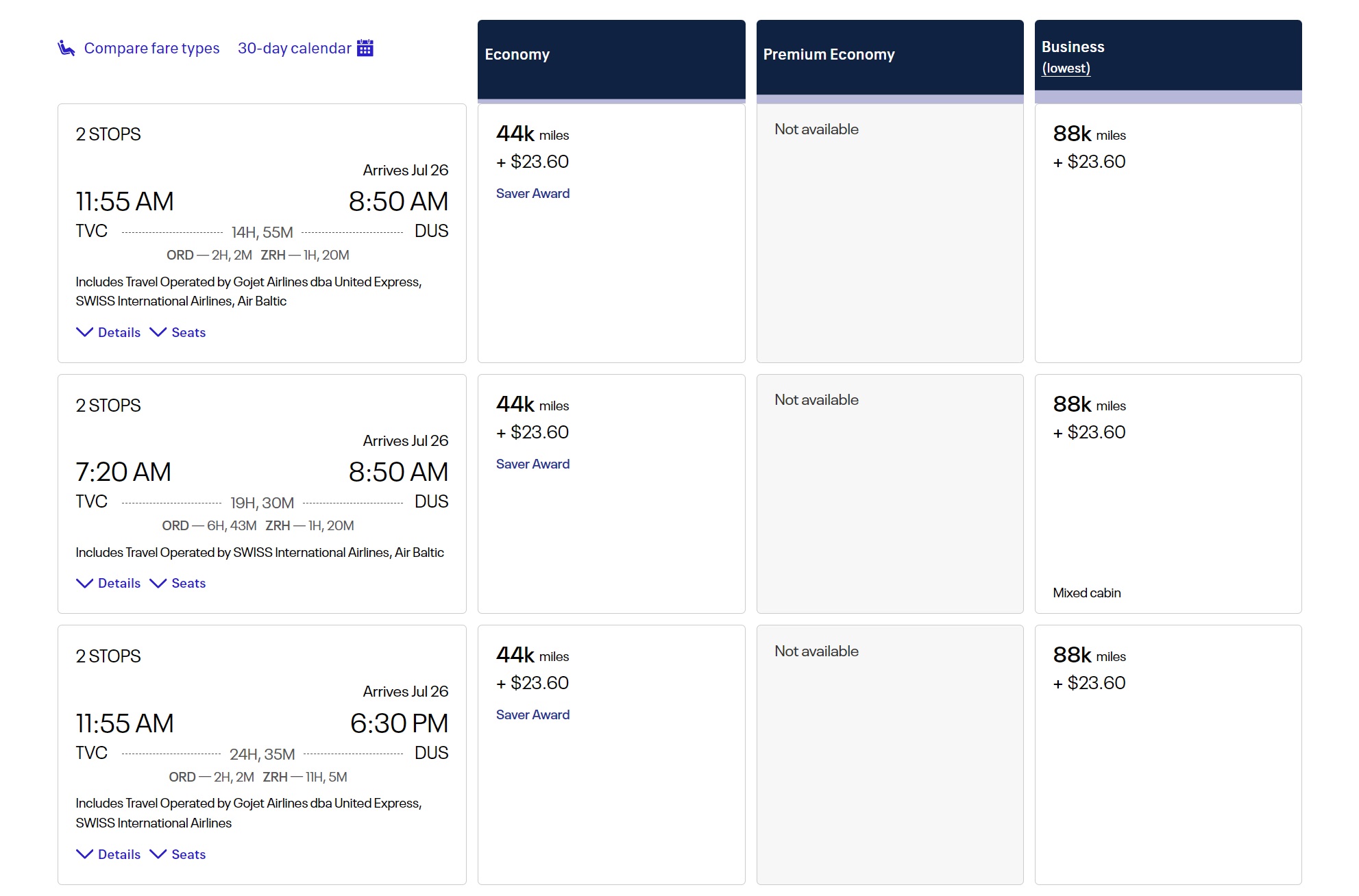
All three options above include travel on SWISS airlines, but if you expand the details, you’ll find that you would first fly from Traverse City to Chicago on United and then on SWISS airlines after that.
Theoretically, those SWISS flights should be available to any Star Alliance carrier. Unfortunately, the United flight from Traverse City to Chicago is not, so if you search from Traverse City to Dusseldorf through other Star Alliance carriers like Air Canada Aeroplan (shown here), you’ll get zero results.

However, if you search from Chicago to Dusseldorf on Air Canada’s website, you will indeed see those SWISS flights since they are indeed available to other Star Alliance programs. As you can see, Air Canada would charge 40K miles in economy class or 70K miles in business class for these awards.

Since you know that those SWISS flights are visible to Star Alliance carriers, you could then check and find that the same flights are available to be booked by Star Alliance program Avianca LifeMiles, where business class would cost just 63K miles.
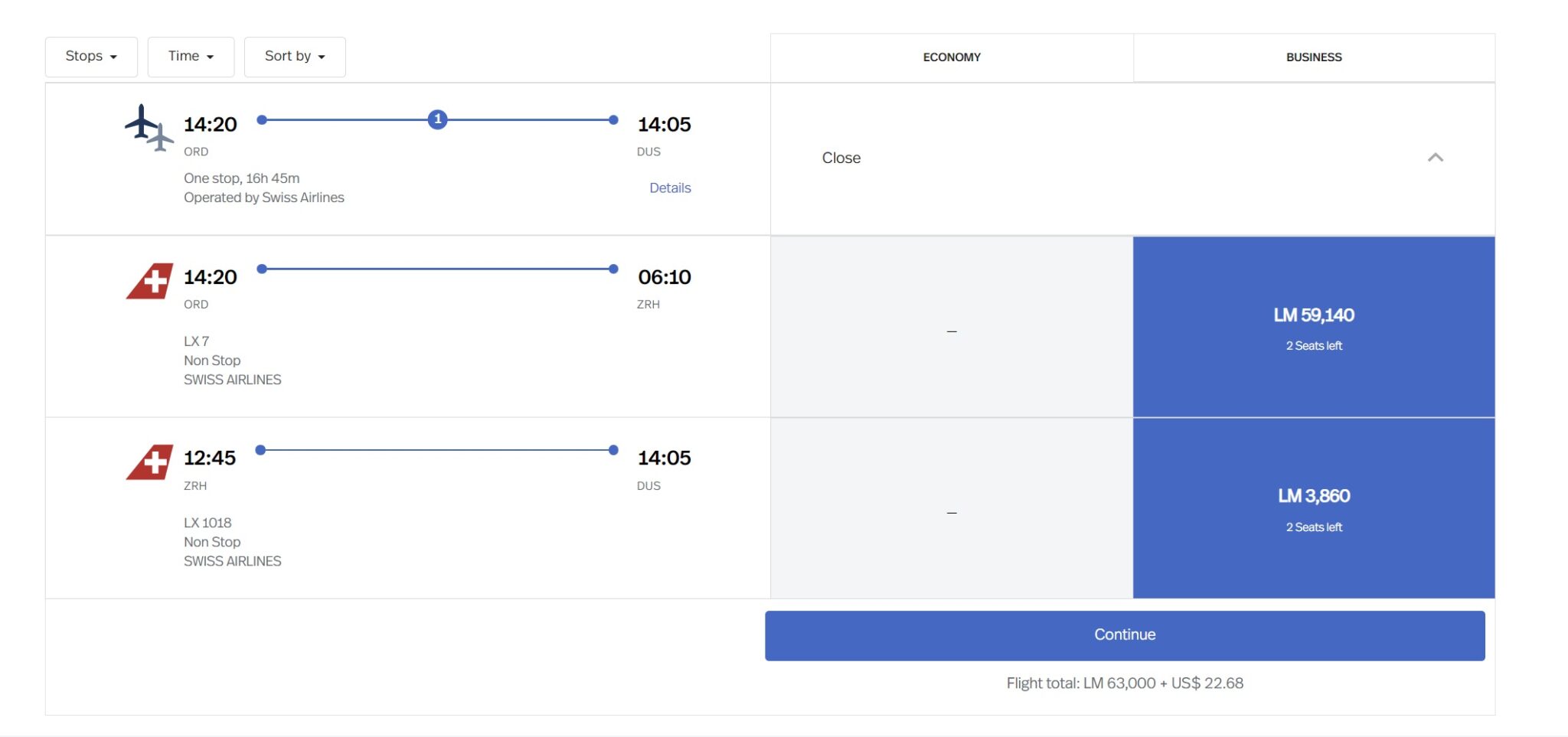
United would charge 88K miles for the itinerary from Traverse City to Dusseldorf. If you were instead to book from Chicago to Dusseldorf, you could pay as few as 63K miles in this instance. Sometimes you might even be able to book a separate ticket from Traverse City to Chicago for just 6,000 miles.

Of course in this example, if you found both Traverse City to Chicago on United and Chicago to Europe on SWISS via Air Canada.com when searching separately, a phone agent could probably help you put them together into a single award ticket.
The above options aren’t the only ways to score a deal on an award ticket to Europe. Check out more options here: See more of the best ways to book flights to Europe in this post
Unfortunately, partner award bookings can sometimes be difficult / frustrating. Sometimes you’ll run into phantom space that appears to be bookable but isn’t. See this post for more information.
SkyTeam partner award flights: Delta.com for airlines other than Delta
SkyTeam can be more challenging in terms of finding partner award availability. Delta.com displays most SkyTeam members. Unfortunately, prices through Delta can be absurdly high. As an example, starting from US gateway Boston, an old examples shows that at one point Delta.com showed a number of itineraries available on KLM for 120K miles and $23 one way.
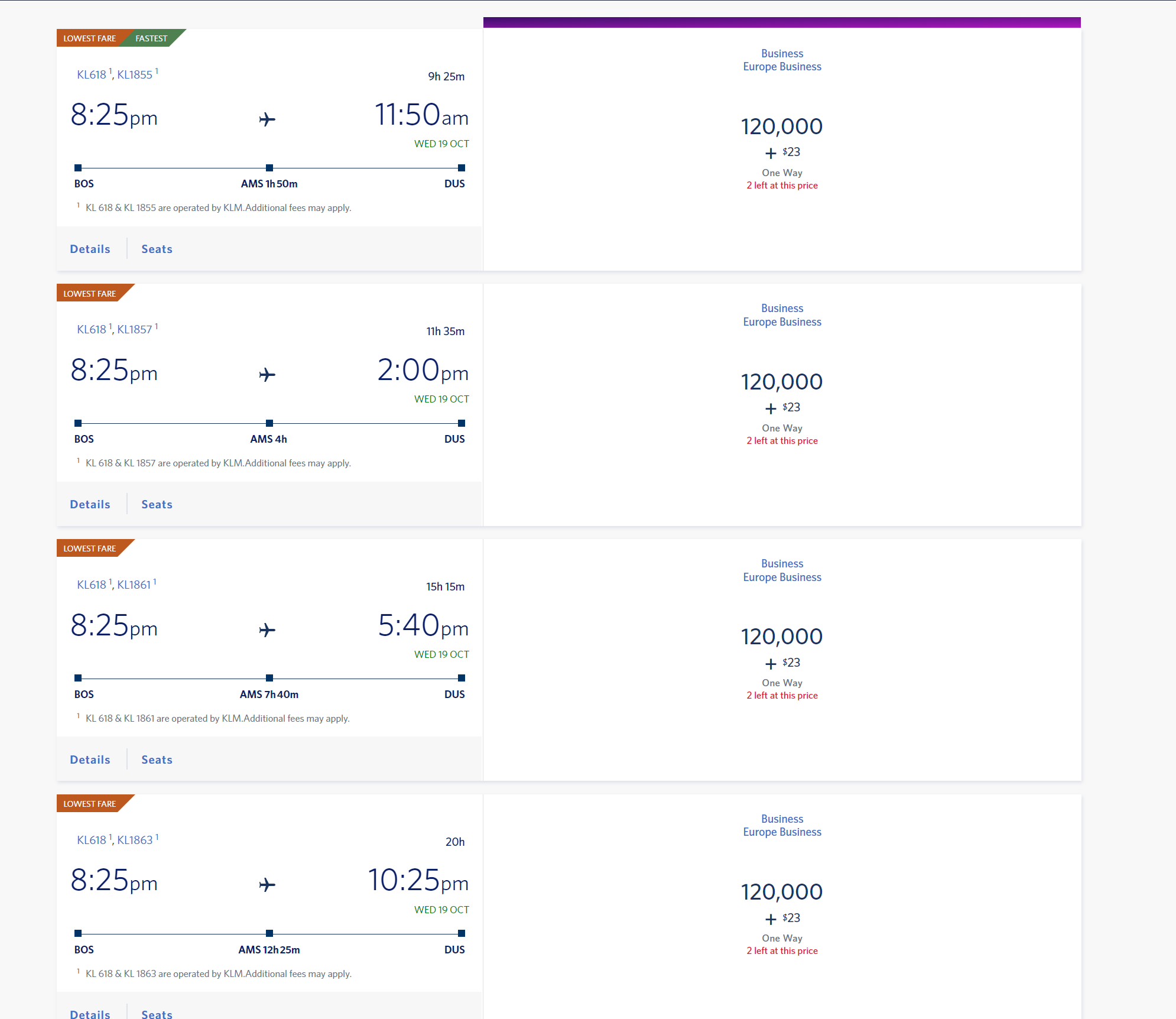
I expected that those same KLM flights would likely be available to other KLM partner airlines. Virgin Atlantic partners with Air France / KLM. Sure enough, the same KLM flights were indeed available via Virgin Atlantic for 56,500 miles plus $266.40. Unfortunately, you won’t find these flights available through Virgin Atlantic until the start of August 2024, but hopefully they’ll come back again.
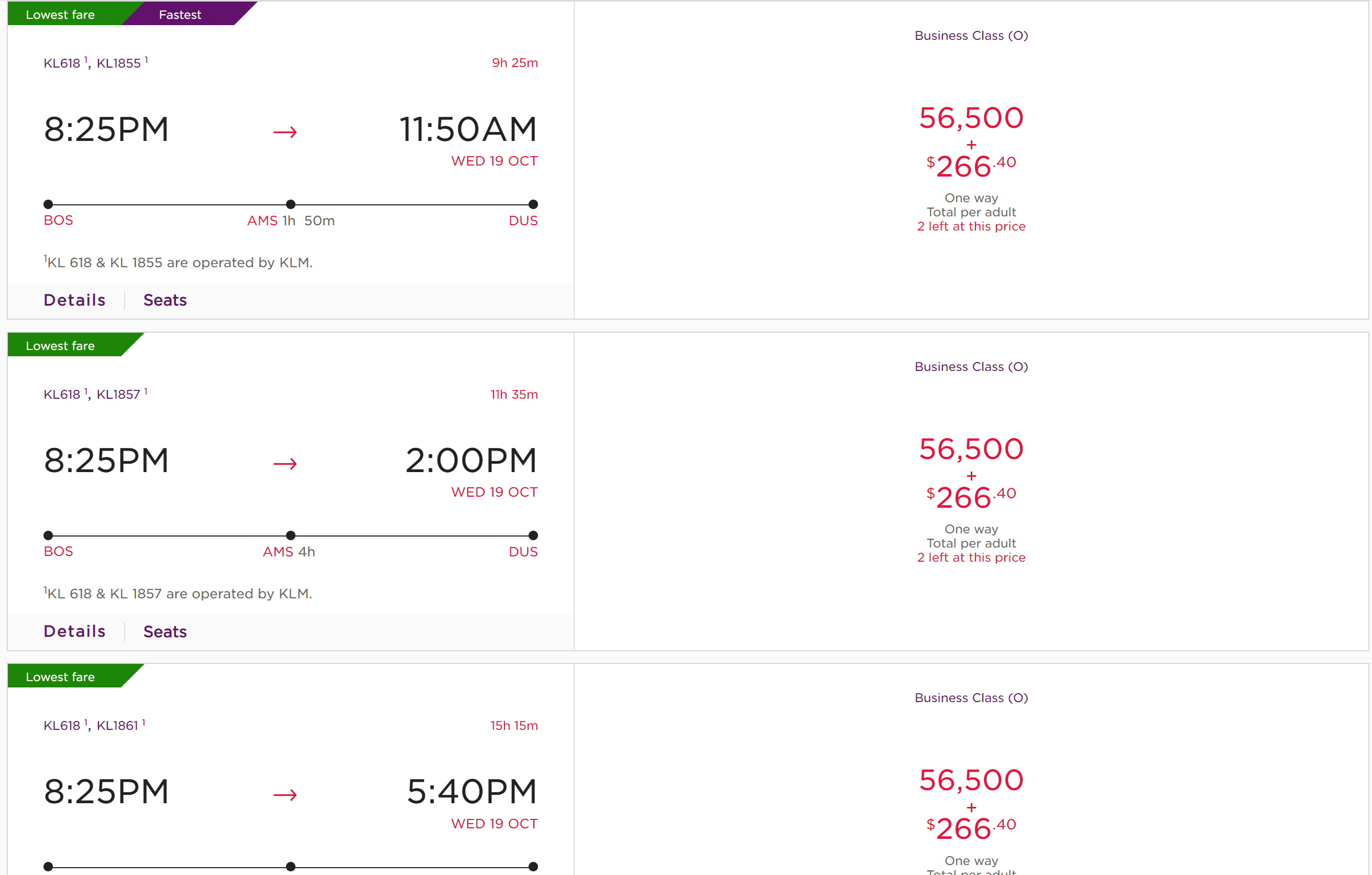
Of course those same KLM flights might be available via AirFrance / KLM Flying Blue directly as well.

If those were the only flights that Jen could find, she would have to consider whether she would like to book a positioning flight to Boston or keep searching for a better option (keeping in mind that availability ebbs and flows).
The best award deals by region
We have a series of posts to help you find the best potential deals on award tickets for travel between the United States and various regions around the world:
- Best ways to get to cities in the US and Canada using miles
- Best ways to get to Europe with miles or money
- Best ways to get to South America using miles (economy and premium cabins)
- Best ways to fly to Hawaii from the US mainland
- Best ways to get to Africa using miles
- Best ways to get to Asia using miles (premium cabins)
- Best ways to get to the Caribbean / Central America using miles
- Best ways to get to Australia, New Zealand, and the South Pacific using miles
Bottom line
Partner awards are where we often find the greatest values in the points and miles world. It is often possible to save miles and/or fly in greater comfort and luxury by mastering the art of booking partner awards. This guide is meant to get you started and we will add to it over time. The amount of information can seem overwhelming at first, but the chances for outsized value are high enough to make the juice worth the squeeze — if you’re going to collect credit card rewards, it is worth sending some time studying partner awards and our many sweet spot posts to get the most out of your miles.




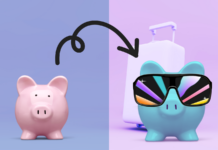
[…] just 7,500 miles8. This is much cheaper than United Airlines’ 25,000 miles for the same trip9. Turkish also lets you book domestic United flights for 7,500 miles in economy and 12,500 miles in […]
Great post. But does one have to be a member of each and every airline loyalty program before tranfer of points?
Well, you don’t need to join *every* airline loyalty program, just the ones you want to transfer your points to (although I recommend signing up with any and all that you might even think you may want to use someday).
It’s kind of like if you wanted to transfer money from your checking account at Wells Fargo to Bank of America. You would need to first open an account at Bank of America in order to have an account number to tell Wells Fargo to send the money to. Miles are no different — yes, you’ll need to have an account number to tell Amex or Capital One or whatever to send your points to.
Sometimes you’ll run into trouble if you open a brand new airline loyalty account today and then you try to transfer hundreds of thousands of points to it today (on Day 1) and redeem them today. That’s why I recommend creating accounts *now* (before you need them). That way it’s not a brand new account the day you go to transfer.
At a base level, because of how broadly useful they are and/or because of the increased space they offer to their own members, I’d probably recommend creating an account with:
While you’re at it, you probably might as well create hotel loyalty accounts with Marriott, Hilton, and IHG (and I’d probably join Wyndham and Choice just because there’s no reason not to).
I left out Delta above, but there might be times when you’d consider transferring Amex points to Delta.
What a great post Nick! When I got in the game I found understanding when and how to book partner redemptions to be extremely confusing. I booked my first international points redemption with an award booking service and am glad that I did. Now, fifteen years later, I book on my own, and am amazed at what I can figure out now.
hey guys, i noticed this
“While you can no longer book Emirates first class with partner miles”
I was recently searching for flights to Singapore and maybe Seoul, can’t remember for sure, and found in Qantas flights with Emirates. Have you guys tried finding Emirates with Qantas? I saw them available, but didn’t try booking them as I didn’t have enough points.
Yes, you can book Emirates flights with Qantas miles, but are you seeing First Class availability? I’d expect you could only book economy with Qantas. Generally speaking, redemptions via Qantas were historically poor value except for the shortest flights, but if you are still seeing first class via Qantas I’d be more curious to look for any sweet spots that still exist.
Thanks so much for this post, Nick! I’ve been needing something like this for several years–I had no understanding of how to approach partner award flights. If you’re looking for topic ideas, I feel similarly challenged by upgrade options–both on flights and hotels. I don’t understand where and how you get them or how to use them. Thanks to everyone at FM for the continued fabulous content!
I think using Virgin Atlantic’s site is ridiculously difficult. It constantly goes in circles between the airline and Virgin Red. I have a quarter million Virgin miles and it is so frustrating. The agents really are not any better as they refuse to book Delta/AF/KLM flights over the phone. They actually state that Virgin miles cannot be used this way. I was told that over 6 calls. UGH!
This is yet another great, informative, well written post. Thank you very much Nick to you, Greg, and the others for such a great site! It’s become my main go to source these past couple months.
Great summary, Nick
You guys have had a great series of posts and podcasts these past 2 months.
Just wanted to let you know that I really appreciate this extremely useful content. (Even if I know a lot of it already, it’s good to see it from another perspective.)
Thank you!
I think something about booking windows would be useful for beginners to also understand, and also a reason that partners are useful. They may complain about why they can’t find partner awards on the dates they want using AA, United, or Delta, without understanding that those seats may have already been taken by someone through a different partner that opens booking earlier.